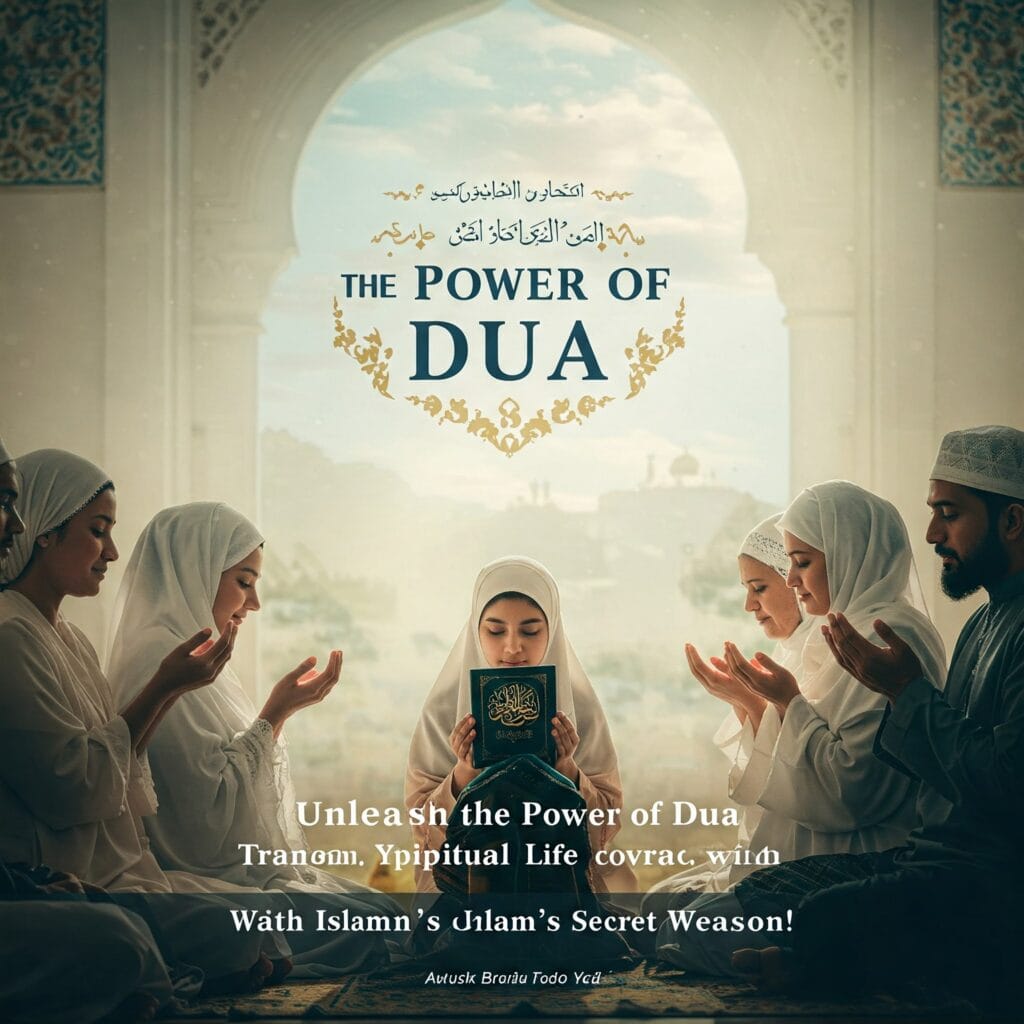In Islam, Dua—the act of supplication—is a profound expression of a Muslim’s direct connection to Allah, embodying faith, humility, and hope. Rooted in the Quran and the Sunnah (teachings of the Prophet Muhammad, peace be upon him), Dua is a universal practice that transcends time and place, allowing Muslims to seek Allah’s guidance, mercy, and blessings in every aspect of life. Whether whispered in moments of joy, recited during hardship, or offered in daily prayers, Dua is a spiritual lifeline for over 1.9 billion Muslims worldwide. This in-depth blog and article explores the significance, types, etiquette, and transformative power of Duas in Islam as of 2025, delving into their theological foundations, practical applications, and cultural expressions. By understanding Dua, we illuminate its role as a cornerstone of Islamic spirituality and its universal appeal as a practice of devotion and resilience.

Theological Foundations of Dua
Divine Invitation to Supplicate
The Quran establishes Dua as a direct channel to Allah, emphasizing His closeness and responsiveness:
“And when My servants ask you concerning Me, indeed I am near. I respond to the invocation of the supplicant when he calls upon Me…” [Al-Baqarah 2:186]
This verse, revealed during Ramadan, underscores Dua as an act of worship (ibadah), affirming Allah’s readiness to answer. The Prophet Muhammad (peace be upon him) reinforced its importance:
“Dua is the essence of worship.” [Jami’ at-Tirmidhi 3371]
Unlike ritual prayers (Salat), Dua is unstructured, allowing Muslims to converse with Allah in any language, at any time, fostering an intimate relationship.
A Universal Act of Faith
Dua is not bound by the Five Pillars but is integral to Islamic life, reflecting trust in Allah’s mercy and power. The Quran describes supplication as a means of seeking forgiveness, guidance, and protection:
“Say, ‘Call upon Allah or call upon the Most Merciful. Whichever [name] you call—to Him belong the best names…’” [Al-Isra 17:110]
The Prophet’s life exemplifies Dua’s centrality, as he supplicated in moments of triumph (e.g., after the Battle of Badr) and adversity (e.g., during the Ta’if persecution), teaching Muslims to turn to Allah in all circumstances.
Types of Duas in Islam
Based on Content
Duas vary by purpose, addressing diverse needs:
- Duas for Forgiveness (Istighfar): Seeking pardon for sins, e.g., “Astaghfirullah” (I seek forgiveness from Allah), as taught in Sahih al-Bukhari (6307).
- Duas for Guidance: Requesting wisdom, e.g., Dua of Istikhara for decision-making: “O Allah, I seek Your guidance by virtue of Your knowledge…” [Sahih al-Bukhari 1162].
- Duas for Protection: Seeking safety from harm, e.g., Ayat al-Kursi (Al-Baqarah 2:255) or “A’udhu billahi min ash-shaytanir-rajim” (I seek refuge in Allah from the accursed Satan).
- Duas for Blessings: Asking for health, wealth, or family, e.g., “Rabbana atina fid-dunya hasanatan…” (Our Lord, give us good in this world…) [Al-Baqarah 2:201].
- Duas for Others: Supplicating for parents, the ummah, or even non-Muslims, reflecting compassion, e.g., “Rabbirhamhuma kama rabbayani saghira” (My Lord, have mercy on them as they raised me when I was young) [Al-Isra 17:24].
Based on Context
Duas are categorized by when or where they are made:
- Daily Duas: Recited during routine activities, e.g., before eating (“Bismillah”), after waking (“Alhamdulillah alladhi ahyana…”), or entering the home.
- Salat-Related Duas: Integrated into prayers, e.g., Tashahhud in Salat or Qunut in Witr prayer.
- Occasional Duas: For specific events, like Dua for rain (Istisqa), travel, or visiting the sick.
- Ramadan Duas: Intensified during Ramadan, especially on Laylat al-Qadr, e.g., “Allahumma innaka ‘afuwwun tuhibbul ‘afwa fa’fu ‘anni” (O Allah, You are Forgiving and love forgiveness, so forgive me) [Sunan Ibn Majah 3850].
Etiquette and Conditions for Dua
Quranic and Prophetic Guidance
The Quran and Sunnah outline etiquette to enhance Dua’s acceptance:
- Sincerity (Ikhlas): Supplicate with a focused heart, trusting Allah’s wisdom, as per Surah Ghafir 40:60: “Call upon Me; I will respond to you.”
- Praising Allah: Begin with hamd (praise) and salawat (blessings on the Prophet), e.g., “Alhamdulillah” and “Allahumma salli ‘ala Muhammad.”
- Humility and Neediness: Acknowledge dependence on Allah, as the Prophet said: “The best supplication is that of a servant who is in need…” [Sunan Ibn Majah 3865].
- Specificity and Repetition: Be clear in requests and repeat Dua three times, as exemplified by the Prophet (Sahih al-Bukhari 6342).
- Raising Hands: A Sunnah practice, symbolizing humility, especially for non-prayer Duas (Sahih Muslim 895).
Optimal Times and States
Certain times and conditions increase Dua’s likelihood of acceptance:
- Times: During Laylat al-Qadr, the last third of the night, after Adhan, between Adhan and Iqamah, during rain, or while traveling.
- States: When fasting, in prostration (sujud), or in distress, as Allah favors the desperate caller (Surah An-Naml 27:62).
- Places: In sacred sites like the Kaaba, Arafat during Hajj, or mosques.
Conditions for Validity
Duas should align with Islamic principles:
- Halal Means: Earnings and food must be lawful, as the Prophet warned against Duas from haram sources (Sahih Muslim 1015).
- No Sinful Requests: Avoid asking for harm or breaking ties of kinship.
- Patience and Trust: Accept Allah’s decree, as Dua may be answered directly, delayed, or substituted with better outcomes (Sahih Muslim 2735).
Transformative Power of Dua
Spiritual Benefits
Dua deepens faith and connection to Allah:
- Intimacy with Allah: Supplication fosters a personal relationship, as Allah is “closer to [man] than his jugular vein” [Qaf 50:16].
- Forgiveness and Mercy: Regular Istighfar cleanses sins, per Surah Hud 11:3.
- Hope and Resilience: Dua instills optimism, as the Prophet said: “No Muslim makes a supplication… unless Allah grants it or averts harm from him…” [Jami’ at-Tirmidhi 3382].
Psychological and Emotional Benefits
Research highlights Dua’s mental health benefits:
- Stress Reduction: A 2025 study in Journal of Islamic Psychology found that Dua lowers anxiety by promoting surrender to Allah’s will, akin to mindfulness.
- Emotional Catharsis: Expressing fears or desires through Dua provides relief, as seen in prophetic Duas during hardship (Sahih al-Bukhari 6346).
- Sense of Control: Supplicating empowers Muslims to navigate challenges, per a 2025 Journal of Religion and Health article.
Social and Communal Impact
Dua fosters empathy and unity:
- Collective Duas: Congregational Duas during Jumu’ah, Ramadan, or Hajj strengthen community bonds, as Muslims pray for the ummah’s welfare.
- Intercession for Others: Praying for others, even strangers, reflects Islamic altruism, e.g., Dua for the oppressed (Sunan Abi Dawud 1535).
- Interfaith Connection: In 2025, interfaith events, like those by the Islamic Society of North America, include shared supplications, promoting harmony.
Cultural Expressions of Dua
Dua adapts to cultural contexts while retaining its essence:
- Middle East: In Saudi Arabia, Duas are chanted during Hajj at Arafat, with talbiyah echoing. Families recite Duas from Hisnul Muslim at gatherings.
- South Asia: In Pakistan and India, Duas are sung in milad gatherings, with Urdu translations of Quranic Duas popular. Dua-e-Qunoot is widely memorized.
- Africa: In Senegal and Nigeria, Sufi communities incorporate Duas into dhikr circles, blending local languages with Arabic.
- Western Countries: In the US and UK, Muslims use apps like Dua & Azkar to access Prophetic Duas, integrating them into busy lifestyles.
These variations highlight Dua’s universal appeal, uniting Muslims in devotion.
Challenges and Misconceptions
Misunderstandings
Some view Dua as a mere wish list, ignoring its spiritual depth. Scholars emphasize that Dua is worship, not transaction, requiring trust in Allah’s wisdom (Surah Ghafir 40:60). Others mistakenly believe Duas must be in Arabic; while Arabic is preferred for Prophetic Duas, any language is valid (Sahih Muslim 2670).
Cultural Superstitions
In some regions, Duas are mixed with un-Islamic practices, like talismans or reciting specific verses for material gain. Scholars, via platforms like IslamQA, urge adherence to Sunnah-based Duas to avoid bid’ah (innovation).
Perceived Unanswered Duas
When Duas seem unanswered, Muslims may feel disheartened. The Prophet clarified that every Dua is answered, either directly, by averting harm, or in the Hereafter (Sahih al-Bukhari 6340). Patience is key, as exemplified by Prophet Ayyub’s steadfast Dua (Surah Al-Anbiya 21:83).
Duas in 2025: Trends and Innovations
Dua evolves with modern tools:
- Digital Resources: Apps like MyDua and websites like Duas.org offer curated Prophetic Duas with translations and audio, enhancing accessibility.
- Social Media: Hashtags like #DuaDaily inspire Muslims to share supplications on Instagram and TikTok, fostering global engagement.
- Virtual Gatherings: Online Dua sessions, hosted by organizations like Al-Maghrib Institute, unite Muslims during Ramadan or crises.
- Mental Health Integration: Islamic counselors incorporate Dua into therapy, with initiatives like Khalil Center promoting Prophetic Duas for anxiety.
These trends ensure Dua remains a vibrant practice in a digital age.
Practical Tips for Making Duas
To enrich their Dua practice, Muslims can:
- Learn Prophetic Duas: Memorize Duas from Hisnul Muslim or apps like Dua & Azkar, starting with daily supplications.
- Follow Etiquette: Begin with praise and salawat, raise hands, and repeat Duas thrice, per Sunnah guidelines.
- Choose Optimal Times: Supplicate during sujud, after Salat, or on Fridays, especially in the last hour (Sahih Muslim 852).
- Be Specific and Sincere: Clearly articulate needs, e.g., “O Allah, grant me a righteous spouse,” while trusting Allah’s plan.
- Include Others: Pray for family, the ummah, and humanity, reflecting selflessness (Surah Al-Hashr 59:10).
- Use Quran-Based Duas: Recite verses like Surah Al-Furqan 25:74 (“Our Lord, grant us from our spouses and offspring comfort…”) for eloquence.
- Join Dua Circles: Participate in mosque or online Dua sessions, amplifying collective supplication (Sunan Abi Dawud 1535).
- Reflect and Journal: Record Duas and their outcomes in a journal or app like Notion to track Allah’s responses.
Conclusion
Duas in Islam are the heartbeat of spiritual connection, weaving faith, hope, and compassion into the fabric of Muslim life. Rooted in the Quran and Sunnah, they offer a timeless means to converse with Allah, seeking His mercy in moments of joy and trial. From personal supplications to collective prayers, Dua unites Muslims in a shared pursuit of divine guidance, fostering resilience and community.
As Muslims embrace Dua in 2025, they draw on a rich tradition enhanced by digital tools and global connectivity, reflecting Islam’s adaptability. The Quran’s promise captures Dua’s essence:
“Call upon Me; I will respond to you…” [Ghafir 40:60]
Must read:
- Discover the Power of Islamic Prayer: Unlock Your Spiritual Connection to Allah!
- Unlock the Quran’s Divine Secrets: Transform Your Life with Islam’s Ultimate Guide!
- Discover Ramadan’s Hidden Power: Transform Your Life with Faith and Compassion!
Frequently Asked Questions (FAQs)
u003cstrongu003eWhat is u003cemu003eDuau003c/emu003e in Islam?u003c/strongu003e
u003cemu003eDuau003c/emu003e is supplication, a direct appeal to Allah for guidance, mercy, or needs, considered the essence of worship.
u003cstrongu003eIs u003cemu003eDuau003c/emu003e mandatory?u003c/strongu003e
While not a Pillar, u003cemu003eDuau003c/emu003e is highly encouraged as an act of faith and reliance on Allah (u003cemu003eSurah Ghafiru003c/emu003e 40:60).
u003cstrongu003eCan u003cemu003eDuasu003c/emu003e be made in any language?u003c/strongu003e
Yes, u003cemu003eDuasu003c/emu003e can be in any language, though Prophetic u003cemu003eDuasu003c/emu003e in Arabic carry special merit (u003cemu003eSahih Muslimu003c/emu003e 2670).
u003cstrongu003eWhen are u003cemu003eDuasu003c/emu003e most likely to be accepted?u003c/strongu003e
During u003cemu003eLaylat al-Qadru003c/emu003e, in u003cemu003esujudu003c/emu003e, after u003cemu003eAdhanu003c/emu003e, while fasting, or in distress (u003cemu003eSurah An-Namlu003c/emu003e 27:62).
u003cstrongu003eWhat if my u003cemu003eDuau003c/emu003e isn’t answered?u003c/strongu003e
Every u003cemu003eDuau003c/emu003e is answered, either directly, by averting harm, or in the Hereafter, per the Prophet’s teaching (u003cemu003eSahih al-Bukhariu003c/emu003e 6340).


Post Comment